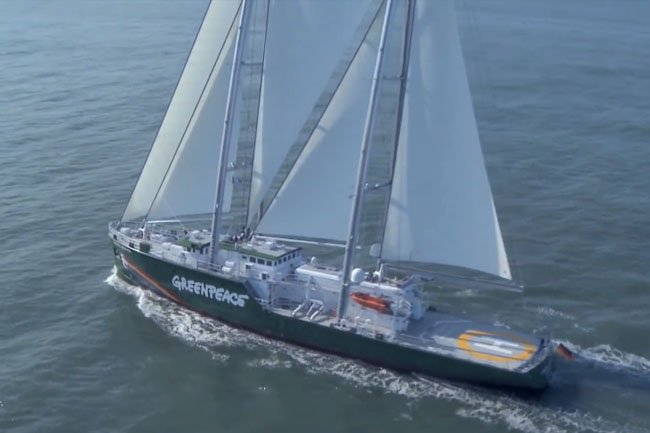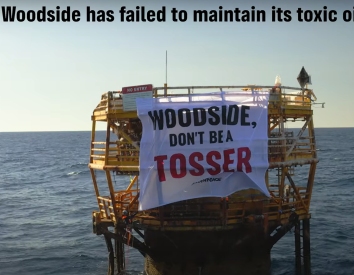After a lack of action from the Government on climate change, it could be up to big businesses to aim for clean energy targets by 2025, writes David Ritter.
AUSTRALIA'S LARGEST companies are some of our biggest energy users, so in order to create tens of thousands of skilled new jobs, modernise our energy grid and help ensure a safe and healthy future for all, big corporates need to step up their act and commit to 100% renewable energy.
On Tuesday night this week, the ABC gave perfect expression to the state of Australia’s national response to climate change when it depicted a round-shouldered Prime Minister being hustled away from a comedian strapped to a big bunch of black balloons.
The dismal failure of Australia’s current federal politicians to do what is needed to safeguard the future security and prosperity of our country is the essential context of Craig Reucassel’s Fight For Planet A: Our Climate Challenge.
The failure of politicians to act on climate change in Australia is a source of immense national frustration. There may yet be some great redemptive turn, but as of now, we are stuck with a Minister for Emissions Reduction who is an anti-wind activist and under whom emissions are increasing, led by a Prime Minister who celebrates the number one driver of the climate emergency — coal.
So, given the pitiful lack of federal political leadership, what can we do?
We’ve got to be straight with each other on this. The world’s top experts empowered by the United Nations have said that we have to make rapid and unprecedented change across all aspects of our economy and society to avoid a climate catastrophe. This is not only possible but could also be immensely creative, creating the opportunity to do a whole lot of other great things at the same time. But we can only achieve this greatest of transformations with systems-level change.
So, how do we do systems-level change if our current political leaders are a bunch of self-interested and unserious drongos?
Fortunately, federal politicians are not the only big decision-makers in our country. We can drive systems change from outside the walls of Parliament House in Canberra. Already, every Australian state and territory has now adopted a net-zero emissions target and close to 100 local government jurisdictions representing roughly 8 million people have declared a climate emergency, with action plans to follow.
And beyond what we consume, we can make a far bigger personal impact by encouraging Australia’s biggest brands to make the switch to 100% renewable energy. Now more than ever, Australia needs decent future-proof jobs, sound investment decisions and economic stability.
Every year, business and industry use approximately 70% of Australia’s electricity, which mainly comes from burning dirty coal. Around the world, some of the biggest companies have already committed to purchasing 100% renewable energy because it’s clean and affordable. Already, over 240 companies have already made commitments to 100% renewable energy via the RE100 initiative — most by 2025.
As the Australian Energy Market Operator recently noted in its most recent Integrated System Plan, Australia ‘is now experiencing the biggest and fastest transformational change in the world’ — but the speed and inevitability of the change are still subject to politics and the malign influence of vested interests.
As Professor Peter Newman observed of the AEMO:
‘The only thing that will put the brake on these technologies becoming the core of the new economy sooner rather than later are backward-looking government policies that seek to prop up an obsolete fossil-fuel economy.’
If Australia’s biggest brands and institutional energy users make the rapid switch to 100% clean energy, then we achieve the triple breakthrough.
First, it will create new demand which will drive investment in renewables. Second, the public story becomes one of big trusted brands shifting to clean energy because of the business case for doing so. Third, the federal politicians will be left isolated – unless they follow corporate Australia’s rush to clean energy – so we change the politics, too.
Big business is not altruistic — corporations exist to maximise profits for shareholders often on very short-term cycles. But the hard-nosed business case for committing to 100% clean energy by 2025 is overwhelming. It saves money for businesses and their customers. That's why the whole Australian brewing sector and Telstra, just to name a few, are switching to 100% renewables.
And this is why other big businesses are now experiencing the rush of boardroom adrenaline which says that change is coming fast.
David Ritter is an Independent Australia columnist and CEO of Greenpeace Australia Pacific, adjunct professor at Sydney University and an honorary fellow of the Law Faculty at the University of Western Australia. You can follow David on Twitter @David_Ritter.
Related Articles
- What's next for Labor on climate?
- Coalition attitude towards climate change is business as usual
- The cost of climate change denial
- Time is running out for a climate adaptation plan
- We need to tackle climate change – but also endless growth
 This work is licensed under a Creative Commons Attribution-NonCommercial-NoDerivs 3.0 Australia License
This work is licensed under a Creative Commons Attribution-NonCommercial-NoDerivs 3.0 Australia License
Support independent journalism Subscribe to IA.













